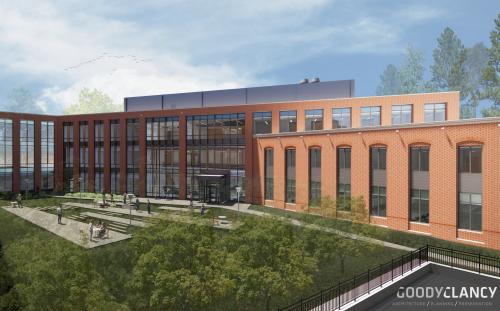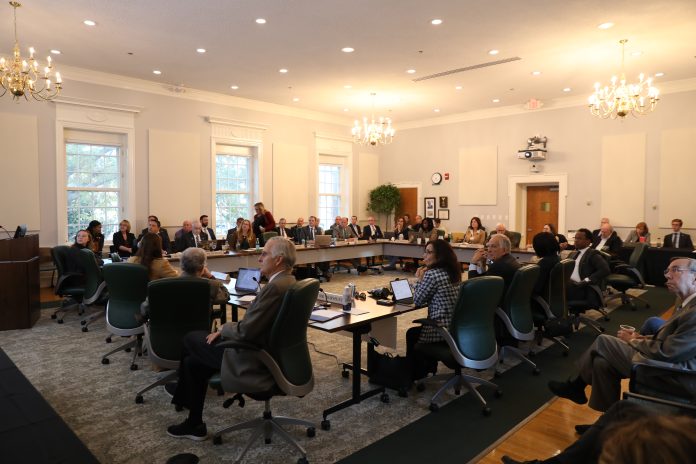Friday, Nov. 17, the board of visitors of the College of William and Mary voted to approve the establishment of a new school of computer science, applied science, data science and physics. Pending approval by the State Council for Higher Education of Virginia, the organizational restructuring will transition to give the four departments currently housed within the School of Arts and Sciences their own status as an independent school. The new school will have its own dean and will be located in the Integrated Science Center IV, officially launching in fall 2025.
Overview of the New School
In 2023, the departments comprising the new school conferred 184 degrees, making up 10.5% of Arts and Sciences graduating undergraduates. Its 48 graduate degrees comprised 39.3% of all graduate degrees and 80% of doctoral degrees conferred in Arts and Sciences this year.
The admissions process to join the new school will take place during undergraduate students’ second year. Introductory courses will still be available to all interested students.

History and Impetus
Members of the board of visitors consulted a pre-read document providing background information on the new school compiled by the administration before the November board meeting. In the document, the administration cited student and employer demand, boosting the College’s national profile, strengthening research and faculty recruitment and promoting interdisciplinary collaborations as the primary reasons for creating the new school.
According to the College’s website, formal discussions regarding establishing a new school for computing and data science began in spring 2022, when College Provost Peggy Agouris named an exploratory ad hoc design team.
She would later form a steering committee tasked with exploring and analyzing options to create a new school. The committee was composed of faculty members and members of the administration, including dean of the Faculty of Arts and Sciences and chancellor professor of English Suzanne Raitt.
According to the executive report by the committee, opponents of the initiative expressed concerns that a new data science-focused school might draw resources away from the rest of the School of Arts and Sciences and undermine the College’s traditional liberal arts strengths. Faculty Assembly liaison to the BOV committee chair and chancellor professor of physics David Armstrong echoed the concern before the board voted for the new school.
“There is some concern amongst colleagues that perhaps this would siphon away resources in Arts and Sciences,” Armstrong said. “And there’s also a concern perhaps that by placing people into a different academic structure would then cause some barriers for collaboration.”
According to the BOV pre-read, the new school’s departments have increased enrollment significantly more than other Arts and Sciences departments. The computer science and physics departments increased baccalaureate degree awards from 30 to 95 (216.7% increase) and 14 to 40 (185.7% increase), respectively, between 2013 and 2023. This compares to 5.4% growth in the same period for Arts and Sciences as a whole.
“This school meets rocketing student interest and will prime graduates to think critically with data, at scale,” College President Katherine Rowe said in an email to students shortly after the board’s approval on Friday.
During the academic affairs committee meeting of the board of visitors on Thursday, Nov. 16, where the bill to approve the creation of the new school was introduced, Rowe cited a Student Assembly bill calling on the administration to mandate enrollment in data science classes as the first impetus for the creation of the new school.
In an interview with The Flat Hat after the board voted to approve the plan for the new school, professor of computer science Andreas Stathopoulos also emphasized the need for coordinated graduate research programs for the rapidly developing fields of each of the four departments that make up the new school.
“I want to double down on the fact that these four departments, the fact that they have Ph.D. programs — notice what their areas are,” Stathopoulos said. “Rapidly moving areas. if you don’t have a Ph.D. program, you cannot catch up. You cannot be a computer scientist, physicist or data scientist and say, you know, I’m teaching what I was teaching in the 90’s or the 00’s. You have to move forward. And to do that, you have to catch up with research that is a little bit different from the structure of some other departments and the rest of Arts and Sciences.”
In the same interview, chair of the physics department and professor of physics Jeff Nelson shed light on the physics department’s unanimous decision to consider joining in on the preliminary discussion of a new school of computing in the fall of 2022. Computation forms an integral part of physics research, with Nelson estimating that around two-thirds of the department’s research is computationally based.
“I convened an ad hoc committee within physics to conduct a series of meetings, focus groups with faculty, discussions about what we thought, first of all, do we want to be involved in, and what structure did we think would be most useful and what were our reasons for wanting to pursue it,” Nelson said.
Just a few months later, in March 2023, the faculty voted unanimously to express interest in joining the potential new school.
Future
The restructuring calls for $1.1 million in funding for new administrative staff to run the school, including a dean, an associate dean of advancement and outreach, a director of finance and a dean’s executive assistant.
According to a briefing document titled “Alma Mater of Innovation” prepared by the College, the College believes a mix of generated tuition and external funding will more than sustain the new school. The College plans to conduct research and surveys to determine the new school’s official name, which is included in the proposal to SCHEV in the spring.
The new school will be the College’s first additional school since 1968 when the College launched the Raymond A. Mason School of Business.
After approval by the board of visitors, the administration plans to apply to SCHEV to get state-level approval of the plan in Spring 2024 and launch in Fall 2025, according to a presentation during the Academic Affairs committee meeting by Agouris. In that time, the administration intends to name a dean of the school in summer 2024 and aims for the competition of ISC IV in summer 2025.


[…] board also formally approved the name for the latest school established last fall as the School of Computing, Data Sciences, and Physics. It is slated to open by fall […]